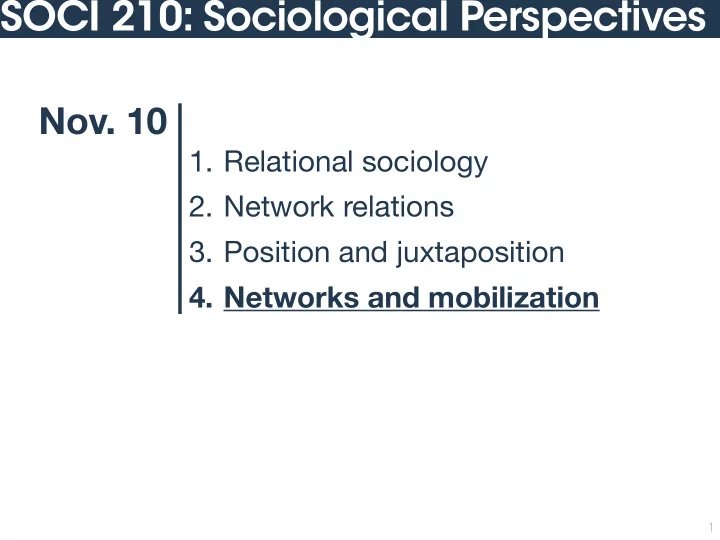

SOCI 210: Sociological Perspectives Nov. 10 1. Relational sociology 2. Network relations 3. Position and juxtaposition 4. Networks and mobilization 1
Networks and Mobilization Gould (1991) 2
Paris Commune Radical socialist government of Paris • In power for two months in 1871 • Implemented progressive programs Democratic elections, secularism, education, labor rights, French Republican Calendar Timeline • Prussian siege of Paris, Sept 1870–Jan 1871 • France cedes control of Paris, agrees to disarm French army • Paris national guard (still armed) takes control, declares Commune on March 26 • May 28, French army regains control of Paris • Tens of thousands of Communards killed during the semaine sanglante , May 21–28 3
Paris Commune 4
Networks and mobilization Multiple Networks and Mobilization in the Paris Commune, 1871 (Roger Gould, 1991) Research question : How did formal and informal networks a ff ect mobilization of resistance in the Commune? 5
Networks and mobilization Empirical analysis • Di ff erent arrondissements showed di ff erent levels of resistance to French army • Arrondissements with many residents serving in battalions of highly committed arrondissements showed substantially higher commitment themselves • Result holds even taking into account geography and residents’ income/training 6
Networks and mobilization Sidebar: reading a regression table 7
Networks and mobilization Sidebar: reading a regression table Dependent variable/ Predicted variable/ Outcome variable/ 8
Networks and mobilization Sidebar: reading a regression table Independent variables/ Predictors/ 9
Networks and mobilization Sidebar: reading a regression table A column for each model 10
Networks and mobilization Sidebar: reading a regression table Stars (*) indicate “significant” coe ffi cients 11
Networks and mobilization Sidebar: reading a regression table 12
Battalion Network autocorrelation size skilled … % Poverty arrond. 2 arrond. 9 Battalion Battalion size size skilled … skilled … % % Poverty Poverty arrond. 3 Battalion size 13
Network autocorrelation Three types of relations: Same neighborhood (informal) Same battalion (formal) Inter-arrondissement 5 6 6 5 5 6 6 5 5 5 6 5 5 6 5 5 5 6 Many residents of arrond. Few residents of arrond. 6 5 serving in arrond. 6 serving in arrond. 5 14
Network autocorrelation 15
Networks autocorrelation 16
Networks and mobilization Two major takeaways • Network structure matters : Relations to others can have far-reaching e ff ects that depend on the larger structure of a network. • Network multiplexity matters : Di ff erent forms of relations (e.g. neighborhood and formal associations) play simultaneous , interconnected roles in a ff ecting behavior. 17
Image credit Propaganda poster Photo BHVP/Roger-Viollet via Wikimedia 18
Recommend
More recommend